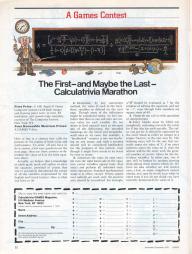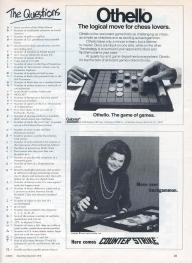I’ve resurrected another post from my defunct old website in response to a Ken Jennings blog topic — this one about a puzzle that obsessed him as a kid.
The one that obsessed me for a while in seventh grade was in Games magazine, and it led more or less directly to my present career as a computer programmer. It was called The Calculatrivia Marathon.
In late 1978, shortly after I began attending Hunter College High School, Games Magazine published a contest that it called “The First — and Maybe the Last — Calculatrivia Marathon.” First prize was:
A 16K Apple II Home Computer System (with both integer and floating point BASIC in ROM, RF modulator, and cassette tape recorder)
 The contest consisted of dozens of trivia questions, each of whose answer was a number. Entrants were required to answer all the questions, then plug the resulting numbers into a fearsome-looking mathematical formula to determine the value of “x.”
The contest consisted of dozens of trivia questions, each of whose answer was a number. Entrants were required to answer all the questions, then plug the resulting numbers into a fearsome-looking mathematical formula to determine the value of “x.”
I don’t know exactly why this contest captured my imagination, nor why the first prize was so appealing to me (I had no particular interest in computers before then) — but it did, and it was. I set to the task with a single-mindedness that my new teachers wished I would devote to my homework.
 At one point I got stuck on the question, “Number of Best Actress Oscars won by Katharine Hepburn.” (Little did I imagine then that in the future I would become involved with The Internet Movie Database, which can supply that answer in a matter of seconds. But in 1978 there was no World Wide Web and we had to do research the old-fashioned way.) I called the research librarian at the New York Public Library and asked the question, and was amazed when the librarian replied without hesitation, “I’m sorry, I can’t answer that; it’s a contest question.” Did they somehow keep track of all the trivia contests going on in the world? Well, I guess that’s what made them research librarians at the prestigious New York Public Library. I tried a research desk at a less prestigious library and got my answer. (Three, at the time; she later earned a fourth for On Golden Pond.)
At one point I got stuck on the question, “Number of Best Actress Oscars won by Katharine Hepburn.” (Little did I imagine then that in the future I would become involved with The Internet Movie Database, which can supply that answer in a matter of seconds. But in 1978 there was no World Wide Web and we had to do research the old-fashioned way.) I called the research librarian at the New York Public Library and asked the question, and was amazed when the librarian replied without hesitation, “I’m sorry, I can’t answer that; it’s a contest question.” Did they somehow keep track of all the trivia contests going on in the world? Well, I guess that’s what made them research librarians at the prestigious New York Public Library. I tried a research desk at a less prestigious library and got my answer. (Three, at the time; she later earned a fourth for On Golden Pond.)
After I assembled all my trivia answers, I consulted my math teacher, Ms. Krilov, for help in interpreting the formula. At the tender age of twelve, you see, I’d never seen a fraction with another fraction in the numerator or denominator. After that was cleared up, I plugged in my numbers and began calculating.
The first two or three times I got totally different answers. But in the end I got a number I could feel pretty confident about. It was something like 117345.0625.
 The contest had been hard, very hard — and I had finished it. Surely only a very few others had gotten as far as I had? My chances of winning the grand prize were clearly very, very good. Of course, I had no idea what such phrases as “BASIC in ROM” meant. During the few months before the contest winner was announced, I went to the school library and checked out “A Basic Approach to BASIC,” by Henry Mullish, and read it cover-to-cover. Then I read it again. When it was due back, I re-checked it out.
The contest had been hard, very hard — and I had finished it. Surely only a very few others had gotten as far as I had? My chances of winning the grand prize were clearly very, very good. Of course, I had no idea what such phrases as “BASIC in ROM” meant. During the few months before the contest winner was announced, I went to the school library and checked out “A Basic Approach to BASIC,” by Henry Mullish, and read it cover-to-cover. Then I read it again. When it was due back, I re-checked it out.
In this way, while waiting to hear from Games Magazine, I learned to write computer programs; and today, programming is my livelihood and my chief avocation.
 In the end, I didn’t win — my answer wasn’t even right. That might have been the end of my programming career right there, but for my new friend Chuck and his dad’s home computer…
In the end, I didn’t win — my answer wasn’t even right. That might have been the end of my programming career right there, but for my new friend Chuck and his dad’s home computer…
Hey, you owe me some credit here! We worked on it together! Remember how silly we felt when they showed the correct answer as something like 12? 🙂